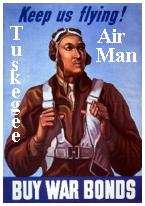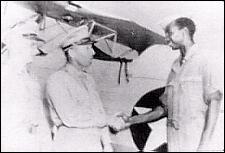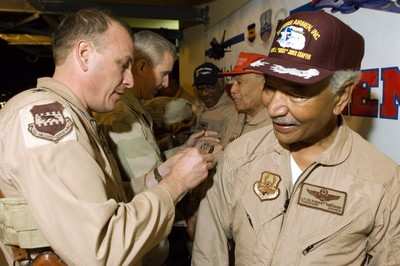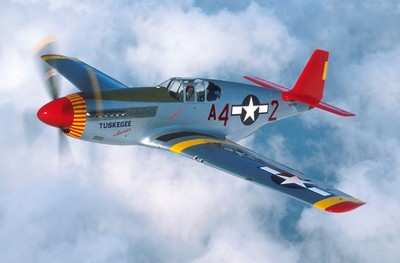First Members Began Training On July 19, 1941
 Sixty-five years after
the Defense Department launched a program to train the first black
military pilots and aircrews, veterans of the Tuskegee Airmen say
they're proud of the barriers they helped break down and the
example they set for today's servicemembers.
Sixty-five years after
the Defense Department launched a program to train the first black
military pilots and aircrews, veterans of the Tuskegee Airmen say
they're proud of the barriers they helped break down and the
example they set for today's servicemembers.
DoD, then called the Department of War, established the
revolutionary Tuskegee Airmen program on July 19, 1941, when the
first members began training at Alabama's Tuskegee Institute and
nearby Tuskegee Army Airfield.
Eighty-five-year-old retired Air Force Master Sgt. Ezra Hill Sr.
recalls that nobody believed the black airmen would succeed.
"Everybody thought we would fail," he said from his home in
Hampton, Va. "They thought we lacked the skills we needed and that
we were cowards."
But Roger Terry, a former Tuskegee Airmen who went on to serve
as president of the Tuskegee Airmen Inc., said he never questioned
his or his fellow black airmen's abilities. "I had no doubt in my
mind that I could fly," said Terry, 85, who lives in Englewood,
Calif.
Terry, Hill and their fellow Tuskegee Airmen proved the
naysayers wrong on all counts, serving with distinction, earning
respect of friendly and enemy forces alike and ultimately, helping
pave the way for integration of the U.S. military.
The first classes of Tuskegee Airmen were trained as fighter
pilots for the 99th Fighter Squadron, destined for combat duty in
North Africa. Their mission was to escort bomber aircraft over
strategic targets to help reduce the heavy losses these crews were
experiencing. Additional pilots were assigned to the 332nd Fighter
Group, which also included the 100th, 301st and 302nd Fighter
Squadrons.
By the war's end, almost 1,000 men had graduated from pilot
training at Tuskegee, and almost half of them went on to combat
assignments overseas.
 During the course of
the war, the Tuskegee Airmen flew more than 15,000 sorties and
fought in the skies over North Africa, Sicily and Europe, in P-40
Tomahawks, then P-39 Air Cobras, then P-47 Thunderbolts, then
finally, P-51 aircraft.
During the course of
the war, the Tuskegee Airmen flew more than 15,000 sorties and
fought in the skies over North Africa, Sicily and Europe, in P-40
Tomahawks, then P-39 Air Cobras, then P-47 Thunderbolts, then
finally, P-51 aircraft.
As they amassed more than 200 combat missions, the Tuskegee
Airmen distinguished themselves by never losing a single bomber to
enemy--a record unmatched by any other fighter group.
Hill credits Col. Benjamin O. Davis Jr., among the first
Tuskegee Airmen to earn his wings. "He told us that if we failed
and lost a bomber because of negligence, that he didn't want us
back," Hill said. "He put a lot of pressure on us, but in doing
that, he made us succeed."
The long list of military awards earned by the Tuskegee Airmen
stands as a testament to that success. Collectively, they earned
more than 744 Air Medals, more than 100 Flying Crosses, 14 Bronze
Star Medals, eight Purple Hearts, a Silver Star, Legion of Merit
and three Presidential Unit Citations.

In May 2006, President Bush signed a bill into law awarding the
Tuskegee Airmen the Congressional Gold Medal, Congress' highest
civilian award.
Tentative plans call for the group to receive the award Nov. 11
during a Veterans Day ceremony.
The road to that success wasn't always smooth for the Tuskegee
Airmen, who battled segregation and prejudice on the ground as they
confronted enemy forces in the air. For example, Terry was
convicted by court-martial of assaulting a white officer while
trying to integrate the all-white officers club at Freeman Field,
IN in 1945. His conviction was overturned 50 years later.
But ultimately, the Tuskegee Airmen broke down racial barriers
in a way never envisioned during their establishment. Davis, one of
the first to earn his silver wings through the program, went on to
become the first African-American Air Force general. Another
Tuskegee Airman, Daniel "Chappie" James, became the United States'
first four-star general.
As the Tuskegee Airmen distinguished themselves both
individually and as a group, they helped pave the way for President
Harry S. Truman's 1948 executive order integrating the armed
forces. "What the Tuskegee airmen did was start a new level of
understanding," Hill said. "They are the ones that changed the
nation."
Last year, seven Tuskegee airmen flew to Balad, Iraq, to speak
with active-duty airmen serving in the 332nd Air Expeditionary
Wing, the current iteration of their former unit.

During the visit, former Tuskegee Airman Col. Dick Toliver
offered encouragement to airmen fighting the global war on terror.
"Don't be afraid to get out of your comfort zone and fight for
what's right," he told them. "You are the Tuskegee Airmen of the
21st century."
Hill said the Tuskegee Airmen's experience still has meaning
today to today's military members. "Don't let anyone tell you what
you can't do," he said. "We proved that you can do it."
(ANN thanks Donna Miles, American Forces Press Service, for
calling attention to this noteworthy anniversary.)
 ANN's Daily Aero-Linx (04.16.24)
ANN's Daily Aero-Linx (04.16.24) Aero-News: Quote of the Day (04.16.24)
Aero-News: Quote of the Day (04.16.24) Airborne 04.10.24: SnF24!, A50 Heritage Reveal, HeliCycle!, Montaer MC-01
Airborne 04.10.24: SnF24!, A50 Heritage Reveal, HeliCycle!, Montaer MC-01 Airborne 04.12.24: SnF24!, G100UL Is Here, Holy Micro, Plane Tags
Airborne 04.12.24: SnF24!, G100UL Is Here, Holy Micro, Plane Tags Airborne-Flight Training 04.17.24: Feds Need Controllers, Spirit Delay, Redbird
Airborne-Flight Training 04.17.24: Feds Need Controllers, Spirit Delay, Redbird






